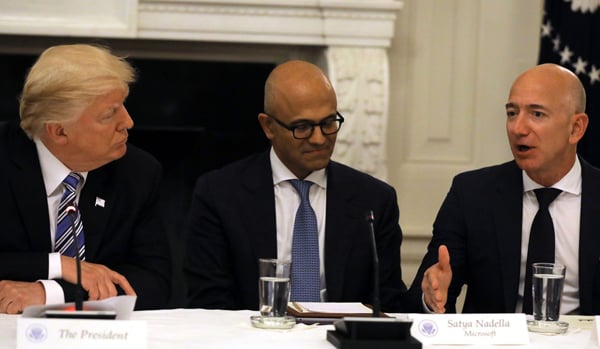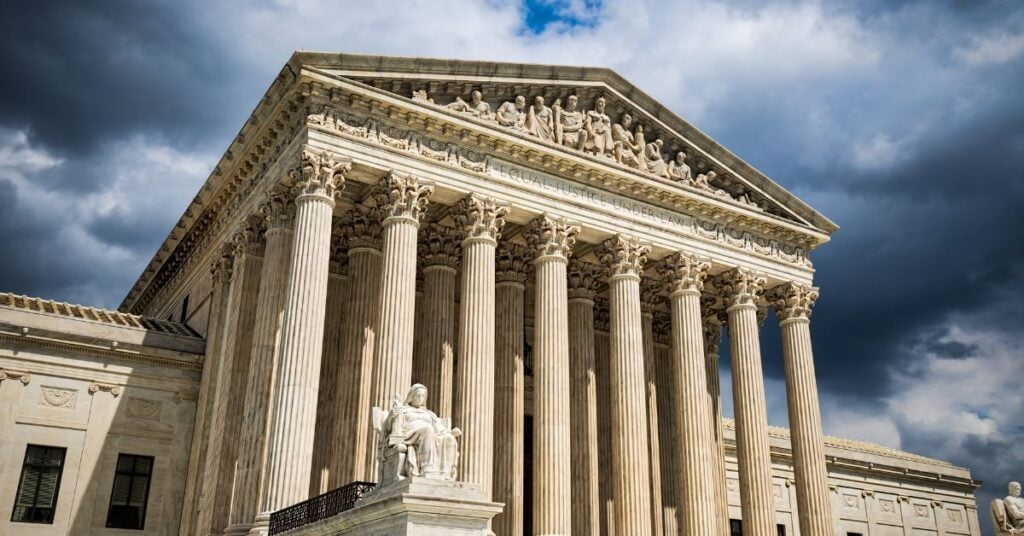In recent weeks, President Trump has been raking Amazon over the coals for failing to collect state and local sales taxes on many of the company’s sales—a criticism that has some merit. But a new story first reported by James Kosur at RedStateDisaster, and then picked up today by the Wall Street Journal, provides fascinating insight into the sales tax collection habits of the Trump Organization’s “official retail website,” TrumpStore.com.
As it turns out, the Trump Organization is even more aggressive than Amazon in refusing to collect sales taxes. According to the company’s website, TrumpStore.com is not collecting state or local sales taxes in 43 of the 45 states that levy such taxes, with Florida and Louisiana being the only exceptions. (UPDATE: Virginia was quietly added to the website’s tax collection list just days after this story broke.) The most astonishing aspect of this non-collection is that the company is not even collecting tax in New York State, despite the fact that TrumpStore.com describes a shop in Trump Tower named “The Trump Store” as “our … flagship retail store.” It seems likely that the presence of a New York location should be enough to put TrumpStore.com within reach of New York’s sales tax collection laws.
It appears that the Trump Organization may have taken a page out of Amazon’s playbook and is using a legal technique called “entity isolation.” Under this approach, TrumpStore.com would be organized as its own subsidiary, meaning that for tax purposes it would often be treated separately from the golf courses, hotels, winery, and other properties also owned by the Trump Organization. This means that despite the Trump Organization having physical locations all around the country, those locations would not create “physical presence” for the TrumpStore.com subsidiary, and thus the online store could, in theory, avoid having to collect sales tax.
But this tactic is legally fraught.
One of its most dramatic tests came in Texas, where the state comptroller sent Amazon a $269 million bill for back taxes after it learned that the company had not been collecting sales taxes in the state despite operating a distribution center in the city of Irving. Amazon said that the distribution center was owned by a subsidiary and did not give it a physical presence in Texas for sales tax purposes, but state tax officials were unconvinced. The battle dragged on for years, and eventually ended with an agreement under which Amazon agreed to dramatically ramp up its investments in Texas and to begin collecting sales taxes moving forward.
In the Trump Organization’s case, questions could be raised in any number of states in which the organization operates hotels or golf courses. Notably, there does seem to be some overlap in the merchandise sold at TrumpStore.com and at the Trump Organization’s physical locations, such as this ladies V-Neck shirt available both from the organization’s website and at the Trump National Golf Course in Palos Verdes, California.
But the most flagrant example of non-collection is New York. TrumpStore.com says its “flagship retail store” is inside Trump Tower, in Manhattan. The Trump Store’s Twitter and Facebook accounts both list the store’s physical location as New York, and its virtual location as TrumpStore.com. And the section of the Trump Tower New York website devoted to the physical Trump Store intermingles directions to the New York retail outlet (“located on the Garden Level”) with appeals to “shop now” at TrumpStore.com.
The Trump Organization (headquartered in New York) and its various arms also frequently advertise for TrumpStore.com via their social media accounts.
Notably, a New York law enacted in 2009 requires remote sellers to collect sales tax if they use a “trademark, service mark, or trade name” that is the same as an affiliate business located inside the state. This law makes the “entity isolation” strategy particularly perilous in New York. Aside from an almost undetectable difference in font choice and the addition of the word “The” to the front of the Trump Tower store’s name, the two stores are otherwise operating under the same name.
Putting aside questions about the appropriateness of a U.S. President criticizing an American company this aggressively, the reality is that Amazon’s sales tax collection practices leave much to be desired. But Amazon is not alone. In fact, the Trump Organization appears to be dodging sales tax collection requirements even more aggressively than Amazon, potentially to the point that it could be in violation of state laws in New York and elsewhere.
Although Amazon and most major “bricks and clicks” businesses (such as Barnes and Noble) abandoned the “entity isolation” sales tax avoidance strategy several years ago, there is little doubt that many other businesses in addition to TrumpStore.com still engage in it. That is why it is so important that the U.S. Supreme Court lay the physical presence test for sales tax collection to rest for good in its upcoming decision in the Wayfair case it will hear on April 17th. Only its complete elimination will nullify, once and for all, the ability of aggressive businesses to exploit gray areas in the law.





